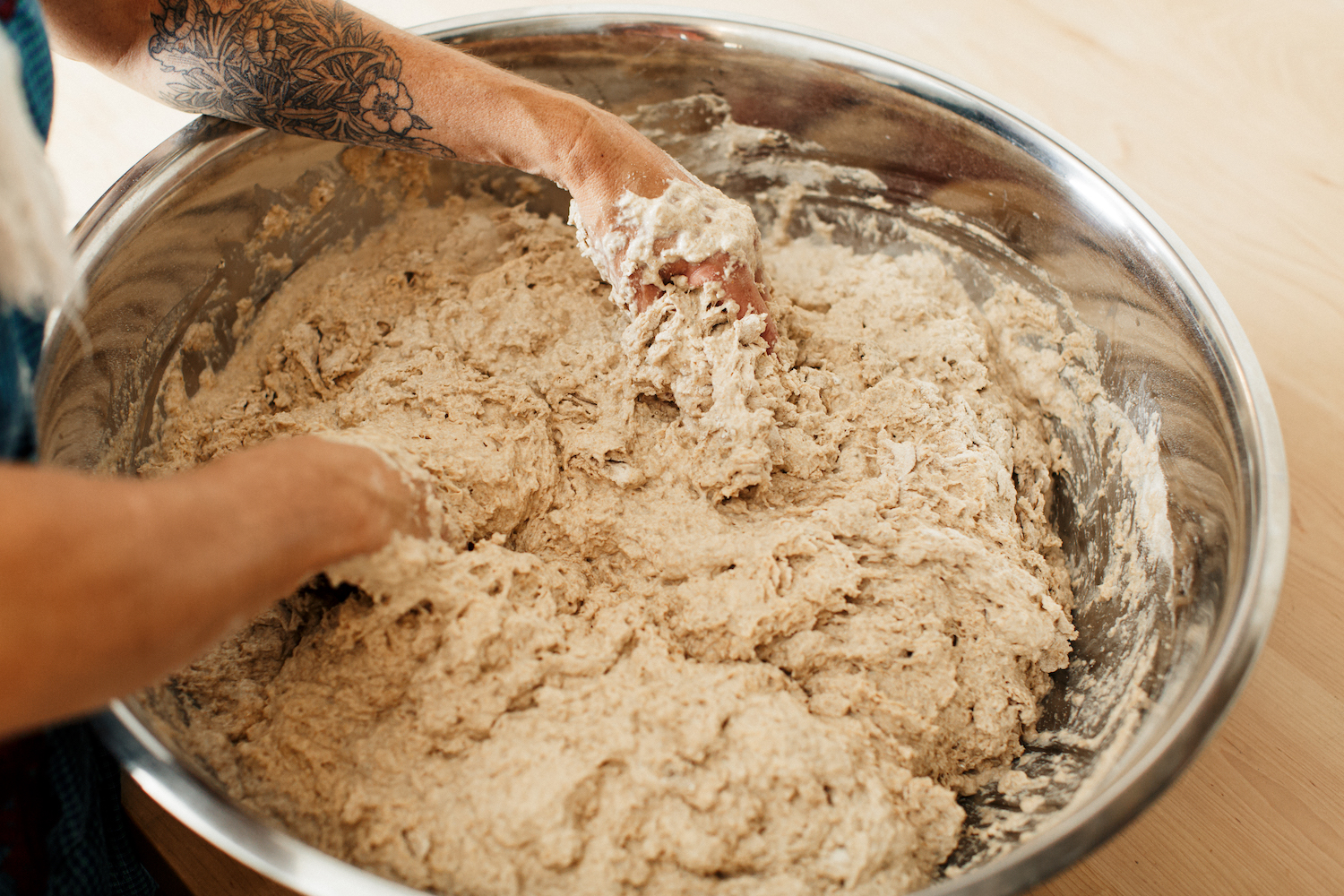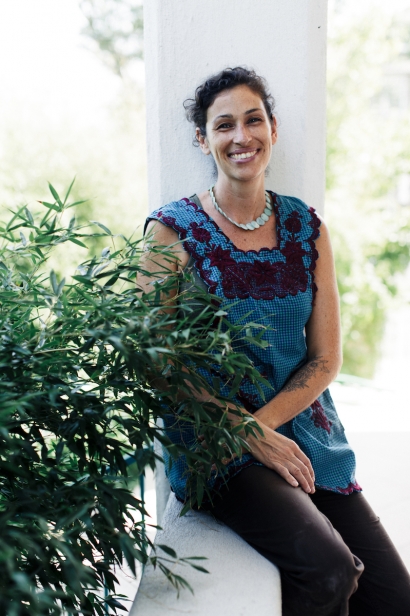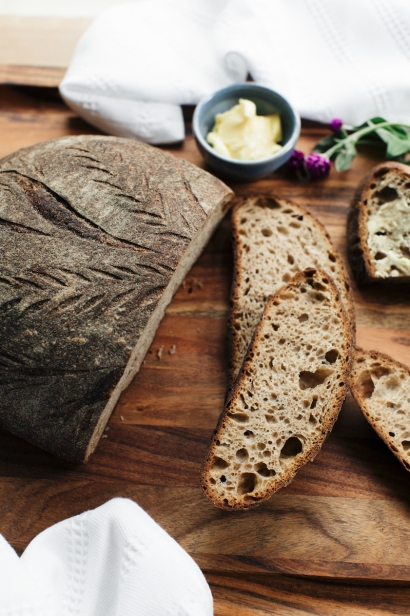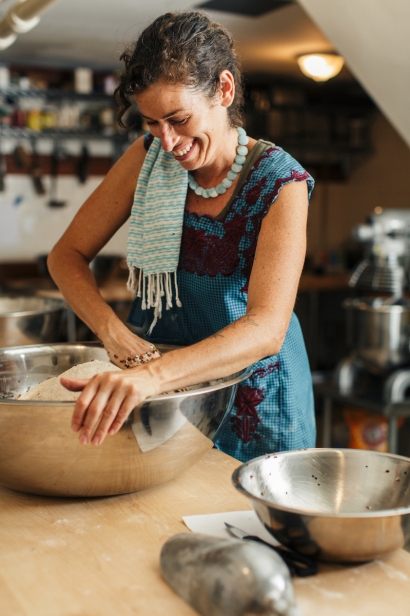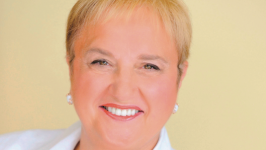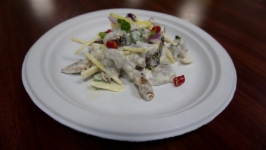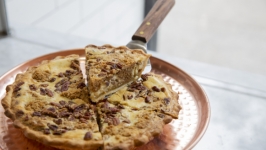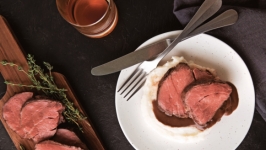Sarah Owens: The unconventional baker chats heritage grains, food deserts and life on the peninsula
Sarah Owens wants you to know she isn’t just a baker. That would be news to her legions of fans, her more than 23K Instagram followers or even the James Beard Foundation, which gave her first book, Sourdough, its award for Baking & Desserts in 2015.
The Tennessee-born Rockaway resident has made a name for herself, thanks to her perfectly scored, photogenic loaves, which incorporate heritage grains and unusual ingredients like beets and butternut squash, and draw from a rich knowledge of herbs, plants and flowers gained during her time as curator of the Brooklyn Botanic Gardens’ Cranford Rose Garden. So the bread we see as central to her reputation is only one of her modes of expression. It’s not that she isn’t a baker; the term “baker” simply cannot contain her multitudes.
An interest in plant and human health, coupled with her own health struggles, is what drew Owens to the baking world. It was only a short time before her baking experiments turned into gifts for friends and colleagues, which turned into a subscription-based business, which ultimately led her to baking professionally—and writing about it.
On a weekday morning I joined Owens as she prepared her seeded sandwich loaf to be sliced, slathered and sold at local delis for end-of-summer beach crowds. “I’m a very creative person who likes to deal with natural elements as much as possible,” she explained as she mixed her starter into water and it bubbled away happily.
“That could be the earth, it could be clay, it could be flour, it could be fruit. I’m always interested in ways that I can manipulate and be manipulated by the elements of nature.”
Observing her work with a few of these elements over several hours, it was clear there was no manipulating. Rather, the act of sourdough baking is intuitive and symbiotic: The yeast within the sourdough needs the right kind of “food” to emit its gases, which in turn cause bread to rise. It takes trial and error to figure out just what temperature water and what kinds of flour— Which grain? Stone-ground or steel-ground?—the yeast will want to snack on, resulting in a well-proofed loaf that can be scored, baked and eaten.
Baking is the kind of hobby—or profession—that everyone has opinions about. It can seem magical to the uninitiated, but those who traffic in it know that a single loaf can represent hours of hard work and years of practice.
“You need to be familiar with ingredients, just like with plants, and know what they need to perform best,” Owens said as the dough rested and she sorted through fruit to be made into winter preserves. “You need to be able to master your craft before you can turn it into an art.”
Indeed, aspects of the intimate monthly baking workshops Owens teaches feel like a science class. You’ll get a crash course in the different parts of wheat, complete with chalkboard drawings, learning what ends up in a typical store-bought bag of flour, and the differences between hard and soft wheat. The workshops take place in this low-ceilinged kitchen, hung with flower and herb bunches and strewn with spice jars, colorful salts and mismatched plates and jugs, some of her own making.
This is not where she lives (her home is a tiny bungalow about a mile away), but the basement of “The Castle,” a Victorian, whitewashed mansion a block from the A train’s last stop. The property of Rockaway food entrepreneur David Selig, it allows her the equipment and space needed to churn out a large volume of bread in the high season. When the weather cools down and the Rockaway boardwalk closes, she makes Christmas cookie subscription boxes, and sells those preserves out of her own kitchen.
Returning to the bread, Owens spreads a mixture of flax and sesame seeds and pepitas over a now-glistening, slightly bulging dough mound in a giant mixing bowl. This blob, which weighs several pounds and will become multiple loaves, needs physical attention. Over the next few hours it will be lifted, folded and tucked, each move carefully orchestrated to strengthen the gluten that will create its structure. Just now, it seems so alive you can convince yourself it’s breathing.
I started baking about a decade ago, when a friend gifted me Tartine Bread by Chad Robertson. It gave me the knowledge to dash off a quick daily loaf and the confidence to be reasonably sure it wouldn’t turn out terribly. But in Tartine’s rush to be the book on sourdough, it left out some details; it didn’t teach you how to hone your skills.
I gravitated towards Owens precisely because her book seemed like the anti-Tartine. Tartine is a cheat sheet to becoming an instant baking champion; Sourdough depicts baking as a process to be enjoyed. There’s a rugged masculinity to Tartine that no doubt helped make it a bestseller, but surely it was Sourdough’s slow, meticulous approach that netted Owens that James Beard Award.
She also takes her time answering questions, and those short silences in between can be deafening to a chatterbox. But Owens isn’t here to fit into any molds, something she makes clear when conversation turns to money and career.
“I’m not interested in the traditional model of capitalism,” Owens said of her decision to come to this peninsula. “That’s hard [for people] to wrap their head around, but Rockaway is used to doing things a bit differently.”
Indeed, Rockaway has a beach bum reputation that runs counter to the rest of New York City, but also belies its reality: Recent reports single it out as one of the city’s worst food deserts. Owens contributes to the community through her collaboration with Edgemere Farm, a nonprofit urban farm on a formerly vacant lot, the only place customers can buy her bread directly. This is not the first time her interests have coincided with the food justice movement. A few years ago, she pursued something similar after moving from her home in Brooklyn to Louisville, Kentucky, where she’d attended college.
“Unfortunately, like a lot of American cities, [Louisville’s] transportation is not great. A lot of these communities have amazing food traditions, but you don’t typically have access to them and they don’t have access to the city. I thought it would be cool to do a food incubator.”
Of course, even the best-laid plans can go in unforeseen directions. Owens didn’t end up founding a nonprofit bakery like Hot Bread Kitchen, but she did plant a community garden on an abandoned parking lot in a historically African-American neighborhood, and that garden is still going strong.
At some point, Owens realized she missed New York City’s diversity, the connections she’d made here and the fact that you can travel the world in an hour by subway. She returned, and is now working on her third book, about heritage grains. The book is subtitled “Time-honored techniques, nourishing traditions, modern recipes,” an apt description of Owens herself. From her Rockaway kitchen, she dares invest the time to nourish herself and those around her, and to piece together a life that is entirely modern, entirely hers and, in the baking world, still unique.
Sarah Owens | @sarah_c_owens
James Beard Foundation | @beardfoundation
Sourdough
Brooklyn Botanic Gardens’ Cranford Rose Garden | @brooklynbotanic
Tartine Bread
Chad Robertson | @chadwrobertson
Edgemere Farm | @edgemerefarm
Hot Bread Kitchen | @hotbreadkitchen


